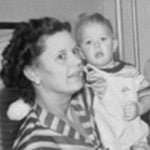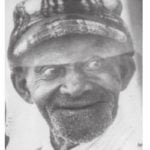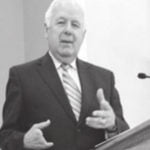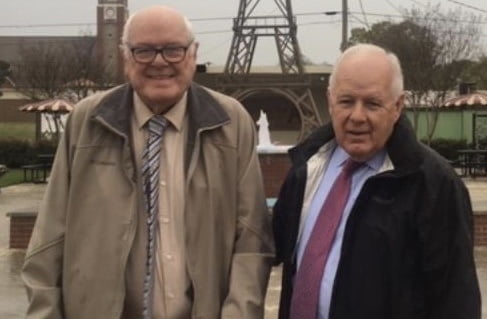Photo above: Charles and Don Richards.
This is another in a series of columns on people who are making a positive impact in our community … in other words, A Lubbock Light.
Editor’s note: I got to know Don Richards when I was editor of the Avalanche-Journal from 2006-2015 and he served as the newspaper’s counsel. Don’s knowledge of media law, public meeting and open records law was amazing and he was a joy to work with. Early on, he went to shake my hand with the hand mentioned in this story and explained how he lost his fingers. But he never told me the story of the 14 Pennies. The bulk of the following was written by Don’s brother Charles, based on a piece Don wrote for his church publication in 2014. I’ve added some from Don’s original piece in italics not in the piece Charles wrote. … Terry Greenberg.
It was 71 years ago on May 7, 1949, in my dad’s weekly newspaper office that my little brother, Donny – 22 months old at the time – got his right hand caught in a printing press, resulting in the amputation of three and a half fingers.
My 11-year-old sister, Mary Beth, three years older than me, was baby-sitting Donny while our mother was working that Saturday morning in her beauty shop only 20 feet or so away on the other side of a partition in a front corner of the Aspermont Star weekly newspaper.
I was in the second grade. Like any other Saturday, I was playing with friends on the courthouse square a block away, in Aspermont, Texas, a town of fewer than a thousand people in ranching country about 90 miles southeast of Lubbock.
My father, Afton Richards, was printing business envelopes on one of his commercial job presses … a press commonly known as a hand-fed “snapper” press.
Mary Beth had come into the office with my brother only minutes earlier. They were standing several feet from where our father was feeding envelopes into the press one at a time. My little brother picked up a short piece of wood and was playing with it, turning it over in his hand.
Just as my father turned away to box the printed envelopes and get more, my sister turned briefly to get a drink of water.
While my father was in the process of getting a new batch of envelopes, Donny walked over to the press, fascinated by its turning iron cogwheel gears. He placed the piece of wood into the gears – which grabbed his hand and crushed the bones in all four fingers.
Mary Beth screamed for her mother and my father quickly began wrapping his hand tightly in shop towels.
There was no hospital in the tiny community, and no ambulance; my parents rushed him to the small clinic three blocks away where he had been born. He received stabilizing treatment, but the clinic was without resources to deal with his mangled fingers.
My father, with my mother trying to calm Donny, drive 31 miles to the hospital in Stamford. This was in the days before power steering, so my dad had to drive left-handed only while keeping pressure with his right hand around my little brother’s right wrist to slow the heavy bleeding.
Donny was in the hospital three days before the doctor fully amputated the middle three fingers and the upper two-thirds of his little finger.
“I do not have a vivid memory of the accident or the subsequent trip to the hospital, but I do have a very vivid image of the red soft drink machine in the hospital lobby as I was hurried to the operating room. I could not yet read, but the white, scripted letters of “Coca Cola” remain etched in my mind (I’m a Dr. Pepper drinker to this day!)
The whole family felt guilty.
 “I felt guilty for working. All we knew to do was shelter you, to do everything for you,” my mother told him in later years, (pictured above holding Don after the accident.)
“I felt guilty for working. All we knew to do was shelter you, to do everything for you,” my mother told him in later years, (pictured above holding Don after the accident.)
My sister told Donny she felt guilty. The babysitter who canceled that day felt guilty. Our dad Donny that he changed his prayers for his children because he felt guilty.
“He told me he previously prayed for God to look after us whenever he couldn’t be around to protect us,” Donny said. “After the accident, he said he prayed that the Lord would watch his children even when he was standing right next to them.”
I was mesmerized nightly as my parents unwrapped his hand, cleaned it, dressed it, and re-wrapped the gauze. I still remember it vividly.
“We coddled you after that,” my mother told my brother. “We totally protected you, did everything for you, and excused you for everything.”
My mother worried the accident would impact him socially and psychologically and make him insecure for life.
 A message from heaven
A message from heaven
Enter Glover Miller (pictured above), who lived one-half block away from the newspaper office with his wife. There were not many black families in Aspermont, but everyone knew and liked him. He took care of our yard, among a number of others in the community.
Every time I saw him working in our yard I would run up to him and say “Hi Mr. Glover!” He was like a grandfather to me. I can remember several times going to his house and knocking on the door. He always invited me in and I ate with them several times.
My sister recalls, “He was one of the kindest men I have ever known, in my entire life.”
Meanwhile, my mother kept finding pennies in my brother’s pockets. When she asked Donny where he got them, he just shrugged his shoulders.
“I just knew you were stealing them. I felt even more guilty this apparently had developed as the result of the accident. My response was to coddle you more and not let you think you had to worry,” she told him years later.
What she didn’t know was Glover Miller was giving pennies to my brother.
“I have a very vivid memory of Mr. Miller – still one of the strongest memories of my very young childhood,” says Don (as he prefers to be called now – Don Richards). “I was allowed to leave the beauty shop or the newspaper office on my own, but only to stay on the same downtown sidewalk in the same block. Everyone in Aspermont knew each other and the people downtown watched over all the children,” Don said.
“It was just a few doors down (from the newspaper office), in front of the hotel, that I would meet Mr. Miller. Not every day, but on periodic occasions, he would greet me with his happy ‘Hello.’ He would see me with my right hand stuck deep inside my pocket.”
Mr. Miller told him, “I will give you as many pennies as you can hold in your hand.”
Don stuck out his good left hand.
“No, not that hand, the other hand,” Mr. Miller told him
He then sheepishly held out his right hand, palm up.
Mr. Miller then would start stacking pennies in his hand.
“As many as you can hold in that hand, you can keep,” he said.
Don says he could hold only two or three at first, “but I started returning to that corner on a frequent basis, looking for that kindly gentleman so I could go for more. As I got better at working my thumb and stub-nosed little finger, I was able to hold more and more pennies in my hand.”
Mr. Miller was constantly encouraging him to add another penny to his prior level of attainment.
“I remember him laughing and saying, ‘You are doing so good with that hand you are going to send me to the poor house!'”
But Mr. Miller always had a pocket full of pennies the next time they met, pushing him toward a new limit. Over a few months, he got up to 14 pennies using only his thumb and stump of his little finger as leverage.
 “It took a while, and a lot of encouragement from him, but I remember being really excited to make it to 14 pennies. It’s something I’ve never forgotten,” said my brother, (shown in picture above holding 14 pennies as an adult).
“It took a while, and a lot of encouragement from him, but I remember being really excited to make it to 14 pennies. It’s something I’ve never forgotten,” said my brother, (shown in picture above holding 14 pennies as an adult).
Then, our mother, suspicious of where her little boy was getting the pennies, stuck her head out of the beauty shop one day and watched him walk down to the corner where he met up with Mr. Miller.
She watched as her little boy held out his hand and Mr. Miller started giving him pennies.
She walked up, relieved in a sense, but also curious. She told her gardener she was afraid her little boy had been stealing the pennies from someone. He then gave HER some advice.
“Mrs. Richards, don’t let him be embarrassed and ashamed of that hand. You got to teach him all the things he can do with that hand,” he told her. “Teach him to use it every day. Teach him to be proud of what he can do with his little hand. Make him learn all the things he can do so that other people will be amazed at what he can do. Don’t ever let him be embarrassed to use it.”
It was a wake-up call for her.
“He shocked me with that so simple advice. I don’t believe he had a formal education, but he had done more teaching you, in short visits on the street corner, than I had done in the months since your accident. He taught me a lot about life,” she said to Don, years later.
It was like a message from heaven, she said, and totally changed the family’s attitude about the accident.
“We had all known Mr. Miller for years, but I knew right then that God had sent him as an angel with a message just for me.”
There would be no more coddling
From that day, she began making her son do things on his own. There would be no more coddling.
“She worked with me to teach me how to hold my glass of milk with my hand. She taught me to hold a knife and fork to cut my food, and worked with me to learn how to button my shirt and tie my shoes and to do all those little things in daily life that require both sets of fingers,” Don said.
Our dad also got involved.
After watching his son awkwardly reaching up to shake hands with his full left hand, he practiced with him, “showing me how to grasp another person’s right hand, using my finger stub so that I could give a firm ‘right’ hand of fellowship,” Don said.
“Most people will be reluctant to shake your hand, but don’t you be reluctant to shake theirs,” my dad told him.
As the years went by, it never even occurred to us that he was handicapped. Whatever other boys did, so did he. He played basketball, football, baseball, golf, and whatever came along.
“I have fond memories of how dad helped me develop a method so that I could play Little League baseball with my friends. He taught me to wear a baseball glove on my left hand, then catch the ball. turn the glove over on top of my right hand as my left hand slid out of the glove to grab the ball and throw … all with one swift motion. He helped me develop my grip to hold a baseball bat.
“I became a starter on the team as the second baseman. … I was a drummer in the band and found there was little I could not do, especially with family that always supported me.”
Truthfully, I seldom remembered he was missing all those fingers. Once, he remarked that he wore his wedding ring on his right hand, and somebody replied, “Your right hand? Why?” Then, we remembered – he doesn’t have any fingers on his right hand. It was a joke.
He learned to set type on a now extinct Linotype that newspapers once used back in the “hot type” days before offset and then computerization. After high school, he worked for the Lubbock Avalanche-Journal part-time as a union typesetter to help pay his college expenses at Texas Tech, where he was a journalism major and eventually editor of the student newspaper.
He was a reporter for the Abilene Reporter-News, followed by stints at several weekly and semi-weekly newspapers – serving as publisher of a couple of them. Then he went to Washington as press secretary for Congressman Kent Hance during the Reagan administration.
He came back to Texas to attend law school at Texas Tech, earning his law degree in 1984 and immediately ran for Congress. He won the 1984 Democratic nomination to replace Hance, but lost in the general election when Republican candidates everywhere were swept in to office on President Reagan’s coattails.
 As an attorney with the law firm Richards, Elder & Gibson in Lubbock he has nearly 37 years of experience practicing public utility law, media law and administrative law.
As an attorney with the law firm Richards, Elder & Gibson in Lubbock he has nearly 37 years of experience practicing public utility law, media law and administrative law.
He has represented more than 40 local exchange carriers before the Texas Legislature and Public Utility Commission and has served as general counsel to Texas Statewide Telephone Cooperative, Inc. for 35 years. For the past seven years, he was also chief counsel for the National Telecommunications Cooperative Association (NTCA), the voice of rural communications nationwide.
He also serves as an adjunct professor at the Texas Tech University School of Law and as an adviser to the Freedom of Information Foundation of Texas. He is a former president of the Panhandle Press Association in Texas and was inducted three years ago into its Hall of Fame.
Don’s final thoughts from his original piece
“None of my family was guilty for my accident. It was my own fault.I put myself in harm’s way, not them. I know I was warned numerous times to stay away from the printing presses. I lost my fingers because the natural Adam-caused sinful nature of man inherent in me. Our sin nature is inherent. We do not have to be taught to sin; we have to be taught not to sin. The loss of my fingers has been my ‘thorn in my side’; but the Lord has provided the blessings of His grace so that I have learned to live with my ‘thorn.’
“Had it been left to me, I would still have my right hand buried deep in my pocket. What Glover Miller actually have me years ago was 14 pennies; but what I actually received from him … was priceless.”

